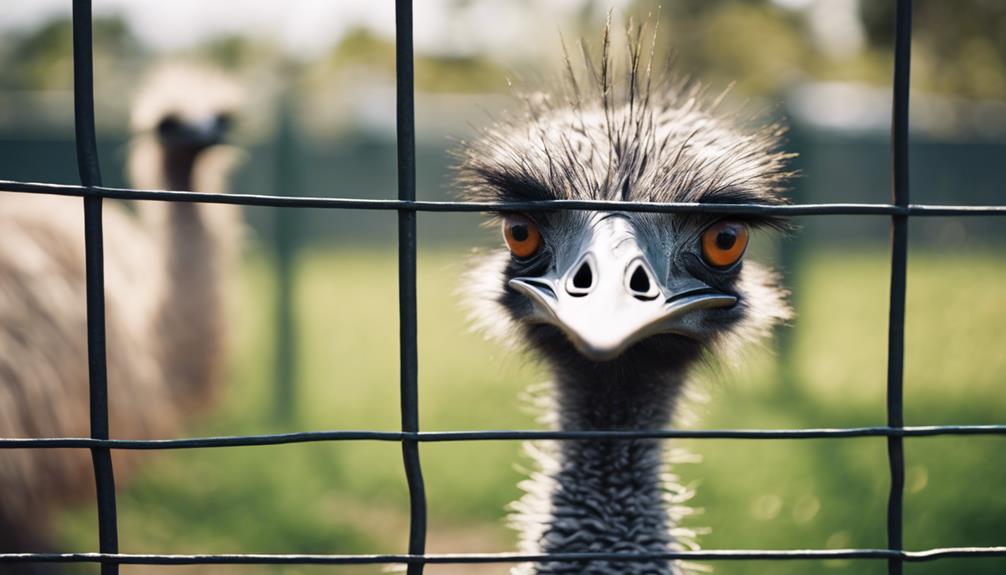
Did you know that emus are susceptible to a variety of common illnesses that can impact their health and well-being? Taking proactive steps to prevent these ailments is key to ensuring your emus lead healthy lives. By focusing on factors like diet, living conditions, and preventative care, you can significantly reduce the risk of your emus falling ill. Stay tuned to discover effective strategies and practices that can help safeguard your emus from common health issues.
Key Takeaways
- Maintain regular health check-ups to monitor for any signs of illness.
- Provide a balanced diet and prevent access to toxic foods.
- Keep the enclosure clean and hygienic to prevent infections.
- Implement parasite prevention strategies through cleanliness and good nutrition.
- Ensure timely vaccinations for essential diseases like EEE/Tetanus and Avian Influenza.
Emu Health Overview

Have you ever wondered how to maintain the health of your emus effectively? Ensuring the well-being of your emus is crucial for their overall performance and longevity. Regular health check-ups are essential to spot any signs of illness early on. Keep a close eye on their behavior, appetite, and feces consistency. Any changes could indicate an underlying health issue that needs immediate attention.
Maintaining a clean and spacious living environment for your emus is paramount. Regularly clean their living quarters and ensure proper ventilation to prevent the buildup of harmful bacteria. Emus are susceptible to respiratory issues, so good air quality is vital for their health.
Additionally, providing your emus with adequate space to move around freely is essential for their physical well-being. Lack of exercise can lead to obesity and other health problems. Make sure they've enough room to roam and engage in natural behaviors.
Proper Nutrition Guidelines
Ensuring proper nutrition for your emus is imperative for their overall health and well-being. Emus need a balanced diet to thrive, consisting mainly of high-quality emu feed specifically formulated for their nutritional requirements. This feed should contain essential nutrients such as protein, vitamins, and minerals to support their growth and immune system. Additionally, emus require access to fresh water at all times to stay hydrated and aid in digestion.
It's crucial to monitor your emus' food intake to prevent overfeeding or underfeeding, which can lead to health issues. Offering occasional treats like fruits and vegetables can provide enrichment, but these shouldn't replace their main diet. Avoid feeding your emus foods that are toxic to them, such as avocado and chocolate.
Consulting with a veterinarian or an emu nutrition specialist can help you create a diet plan tailored to your emus' specific needs. By following proper nutrition guidelines, you can promote the health and longevity of your emus.
Enclosure Hygiene Practices

Maintaining cleanliness in your emus' enclosure is essential for preventing common illnesses and promoting their overall well-being. Regularly remove feces, uneaten food, and any debris from the enclosure to prevent the buildup of harmful bacteria. Replace bedding materials frequently to ensure a dry and hygienic environment, as dampness can lead to bacterial and fungal growth. Disinfect the enclosure periodically using avian-safe products to eliminate germs and pathogens.
Monitor water sources to prevent contamination and change the water daily to ensure freshness. Keep feeders and waterers clean to avoid bacterial growth and potential infections. Inspect the enclosure for any signs of pests like mites or flies, as they can transmit diseases to your emus. Implement a regular cleaning schedule to maintain optimal hygiene levels.
Regular Veterinary Check-ups
Regular veterinary check-ups are crucial for monitoring the health and well-being of your emus. By scheduling routine visits with a qualified avian veterinarian, you can ensure that any potential health issues are identified and addressed promptly. During these check-ups, the veterinarian will conduct thorough physical examinations, assess your emus' overall condition, and provide valuable insights into their health status.
These regular veterinary check-ups also present an opportunity for you to discuss any concerns or observations you may have regarding your emus' behavior, appetite, or general demeanor. The veterinarian can offer guidance on nutrition, environmental enrichment, and other aspects of emu care to optimize their health and prevent illnesses.
In addition, veterinary professionals can administer necessary vaccinations, such as against common diseases like fowl pox, ensuring that your emus are protected against potential threats. These preventative measures can significantly reduce the risk of your emus falling ill and contribute to their longevity and well-being. Remember, proactive care through regular veterinary check-ups is a powerful tool in safeguarding the health of your emus.
Parasite Prevention Strategies

To safeguard your emus' health further, addressing parasite prevention strategies is imperative in maintaining their well-being. Parasites can severely impact your emus' health and productivity if left unchecked. Here are some expert strategies to help you prevent parasitic infestations:
- Regularly Clean and Disinfect Living Areas: Ensure to clean and disinfect your emus' living spaces regularly to minimize the risk of parasites breeding and spreading.
- Implement a Strategic Grazing System: Rotate grazing areas to prevent overgrazing and reduce the concentration of parasites in specific areas where your emus feed.
- Provide Adequate Nutrition and Hydration: A well-balanced diet and access to clean water are essential in maintaining your emus' health and immunity, making them less susceptible to parasitic infections.
Vaccination Importance
Ensure the health and longevity of your emus by prioritizing the critical aspect of vaccination against common illnesses. Vaccination plays a crucial role in protecting your emus from a range of potentially devastating diseases. By staying up to date with vaccinations, you are actively safeguarding your emus' well-being and ensuring they lead healthy lives. Below is a table outlining some key vaccinations for emus to give you a clear overview of the essential immunizations:
| Vaccination Type | Recommended Age | Frequency | Importance |
|---|---|---|---|
| EEE/Tetanus | 6 months | Annually | Protects against deadly diseases |
| Avian Influenza | 6 weeks | Semi-annually | Prevents widespread bird flu outbreaks |
| Newcastle Disease | 8 weeks | Annually | Vital for respiratory health |
| Fowl Pox | 4 months | Once | Guards against skin infections |
Staying vigilant about vaccination schedules is a powerful tool in your arsenal to keep your emus strong and resilient against common illnesses.
Stress Reduction Techniques

To maintain optimal health and well-being for your emus, implementing effective stress reduction techniques is imperative. Emus can experience stress due to various factors such as changes in their environment, interactions with other animals, or even loud noises. Managing their stress levels is crucial for their overall health and productivity.
Here are some powerful stress reduction techniques to consider:
- Provide Adequate Space: Ensure that your emus have enough space to move around freely. Crowded environments can lead to increased stress levels.
- Establish a Consistent Routine: Emus thrive on routine, so try to maintain a consistent schedule for feeding, cleaning, and other activities.
- Offer Enrichment Activities: Stimulate your emus' minds by providing enrichment activities like puzzles, foraging opportunities, or safe objects to peck at. This can help reduce boredom and stress.
Climate Control Measures
Implementing proper climate control measures is essential to ensure the well-being and comfort of your emus in their environment. Emus are sensitive to temperature extremes, so maintaining suitable conditions is crucial. To regulate the climate effectively, start by providing adequate shade in hot weather to prevent heat stress. This can be achieved through natural shading from trees or artificial structures like shade cloth.
During colder periods, ensure your emus have access to shelter that protects them from wind and rain. A well-insulated shelter will help maintain a stable temperature and protect your emus from harsh weather conditions. Monitoring the temperature within the shelter using a thermometer can assist in ensuring it remains within the optimal range for emus.
Additionally, consider installing fans or misters in hot climates to provide cooling relief for your emus. These measures can help prevent heat-related illnesses and keep your emus comfortable. By implementing these climate control strategies, you can create a conducive environment that promotes the health and well-being of your emus.
Water Quality Management

Maintaining optimal water quality is crucial for the health and well-being of your emus in order to prevent common waterborne illnesses. To ensure your emus have access to clean and safe drinking water, follow these expert tips:
- Regular Testing: Conduct routine water quality tests to check for pH levels, bacterial contamination, and mineral concentrations. Regular monitoring allows early detection of any issues.
- Proper Filtration: Invest in a reliable water filtration system to remove impurities and contaminants. This will help maintain the purity of the water your emus consume.
- Routine Cleaning: Clean water containers and troughs regularly to prevent the buildup of algae, bacteria, and other harmful substances. Proper sanitation practices are essential for keeping the water source safe for your emus.
Exercise and Enrichment Tips
Ensuring your emus engage in regular physical activity and mental stimulation is essential for their overall well-being and health. Emus are naturally active birds, so providing ample space for them to roam and explore is key. Enclosures should be spacious to allow for running and stretching their legs. Consider adding obstacles like logs or low hurdles to encourage movement and agility. Emus also benefit from enrichment activities to stimulate their minds. Introduce novel objects like shiny items, hanging treats, or puzzle feeders to keep them engaged and prevent boredom.
To further enhance their well-being, consider rotating their environment or introducing new elements regularly. Emus are curious creatures that thrive on novelty. Providing opportunities for foraging by hiding treats or scattering food can mimic their natural behaviors. Additionally, social interaction with other emus or even other compatible species can promote mental stimulation and overall health. Remember, a stimulated emu is a healthy emu.
Early Signs Detection

For early detection of common emu illnesses, attentively observe your emus for subtle changes in behavior or physical appearance that may indicate underlying health issues. Emus are resilient creatures, but they can still fall prey to various illnesses. By staying vigilant, you can catch potential problems early on and ensure prompt treatment.
Here are some key signs to watch out for:
- Changes in Eating Habits: A sudden decrease or increase in appetite could signal an issue.
- Unusual Discharge: Keep an eye out for any abnormal discharge from the eyes, nose, or mouth.
- Altered Behavior: If your emu is unusually lethargic, agitated, or displaying unusual behaviors, it may be a cause for concern.
Regularly monitoring your emus for these signs can help you intervene at the first sign of trouble, potentially preventing more serious health issues down the line. Remember, early detection is key to maintaining the health and well-being of your emus.
Emergency Response Plan
To effectively respond to emergencies concerning your emus, establish a detailed plan outlining specific actions and protocols to follow in various scenarios. Having a well-thought-out emergency response plan can make a significant difference in the outcome of an unexpected situation. Below is a structured table to guide you in creating your own emergency response plan for your emus:
| Emergency Type | Action Steps | Contact Information | Supplies Needed |
|---|---|---|---|
| Injury or Illness | 1. Assess the emu's condition. | Local Vet Clinic | First Aid Kit |
| 2. Administer basic first aid if needed. | Animal Control | Clean towels | |
| 3. Transport emu to vet if necessary. | Bandages | ||
| Predator Threat | 1. Secure emus in a safe enclosure. | Nearest Wildlife Rescue | Bright flashlight |
| 2. Contact wildlife authorities. | Police Department | Noise-making tools | |
| 3. Inspect perimeter for breaches. | Secure locks | ||
| Extreme Weather | 1. Move emus to a sheltered area. | Local Weather Service | Heat lamps |
| 2. Provide extra bedding for warmth. | Emergency Contacts | Water containers | |
| 3. Monitor weather updates regularly. | Food supplies |
Frequently Asked Questions
Can Emus Coexist With Other Farm Animals?
Yes, emus can coexist with other farm animals, but proper planning and care are crucial. Ensure adequate space, separate feeding areas, and monitor interactions. Establish boundaries to reduce stress and potential conflicts, promoting a harmonious environment for all animals.
What Are Common Behavioral Issues in Emus?
To address common behavioral issues in emus, observe their social interactions, provide ample space for exercise, and establish a routine for feeding and care. Consistent handling and positive reinforcement can help manage any aggression or territorial behavior.
How Do Emus Socialize With Each Other?
Imagine emus in the wild, forming tight-knit groups. They communicate through low-frequency sounds and intricate body language. Socializing helps them establish hierarchies, find mates, and protect each other from predators. Emus value companionship greatly.
Are Emus Prone to Specific Allergies?
Emus, like other animals, can develop specific allergies. It's crucial to monitor their environment and diet for potential allergens. Consulting a vet can help identify triggers and establish a plan to manage their allergies effectively.
What Is the Average Lifespan of an Emu in Captivity?
In captivity, emus can live up to 10-20 years. Their lifespan depends on factors like diet, living conditions, and healthcare. With proper care and attention to their needs, you can help ensure they live a long, healthy life.
Conclusion
In conclusion, by implementing proactive prevention measures such as proper nutrition, regular veterinary check-ups, and parasite prevention strategies, you can help ensure your emu's overall well-being and reduce the risk of common illnesses.
Remember to monitor behavior, maintain enclosure hygiene, and provide ample exercise and enrichment.
Stay vigilant in detecting early signs of illness and have an emergency response plan in place.
With dedication and diligence, you can promote peak emu health and happiness.




